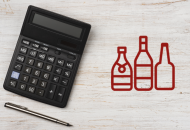As they were used to exceptional growth rates (more than 30% per year on average between 2008 and 2015), online wine sales are expected to increase in France by 6% per year (only) in average by 2022 to reach 1.9 billion euros (compared to 1.5 billion in 2018, or 10% of the total market for all channels combined).
Alcoholic beverages are one of the few sectors for which e-commerce is not prohibited (unlike tobacco for example) but which nevertheless remains materially difficult intra-EU as it stands. Main blockage? The declarative terms and conditions for excise duties in Europe.
Alcoholic beverages, within the meaning of EU excise regulations, are drinks with actual alcoholic volume exceeding 1.2% (with the exception of beers which are considered as alcoholic beverages when actual alcoholic volume exceeds 0,5%).
According to the applicable European Directive[1], the excise duties due on online sales performed to private individuals (B2C) are payable by the seller in the Member State of consumption on the one hand, and subject to two declarations for one order dispatched and delivered on the other hand.
The large volume of transactions specific to e-commerce allows us to easily imagine that the administrative burdens then generated tend to accentuate the operators’ lack of conformity, or worse: fraud circuits.
The shortfall in terms of public finance is proportional to the growth of the e-commerce market for alcoholic beverages, so extremely significant. As regards of French excise declarations, EUROTAX has thus worked with the French customs authorities and the Ministry of Public Finance so that declarative procedures adapted to e-commerce can be adopted. Through our association EDRA (European Excise Duty Representatives Alliance) we are broadening our awareness-raising efforts with a dozen Member States of the European Union in order to facilitate the excise duty compliance processes of e-merchants.
What does the European Directive requires
The following is an extract from the current European Directive on the general excise regime. Every online store selling alcoholic beverages to individuals within the EU should comply:
1. Excise goods already released for consumption in one Member State, which are purchased by a person, other than an authorised warehousekeeper or a registered consignee, established in another Member State who does not carry out an independent economic activity, and which are dispatched or transported to another Member State directly or indirectly by the vendor or on his behalf shall be subject to excise duty in the Member State of destination.
For the purposes of this Article, ‘Member State of destination’ shall mean the Member State of arrival of the consignment or of transport.
2. In the case referred to in paragraph 1, the excise duty shall become chargeable in the Member State of destination at the time of delivery of the excise goods. The chargeability conditions and rate of excise duty to be applied shall be those in force on the date on which duty becomes chargeable.
The excise duty shall be paid in accordance with the procedure laid down by the Member State of destination.
3. The person liable to pay the excise duty in the Member State of destination shall be the vendor. However, the Member State of destination may provide that the liable person shall be a tax representative, established in the Member State of destination and approved by the competent authorities of that Member State, or, in cases where the vendor has not respected the provision of paragraph 4(a), the consignee of the excise goods.
4. The vendor or tax representative shall comply with the following requirements:
(a) before dispatching the excise goods, register his identity and guarantee payment of the excise duty with the competent office specifically designated and under the conditions laid down by the Member State of destination;
(b) pay the excise duty at the office referred to in point (a) after the excise goods arrive;
(c) keep accounts of deliveries of excise goods.
ARTICLE 36 OF THE DIRECTIVE 2008/118/CE – DISTANCE SELLING
The appointment of the Tax Representative Excise (or agent)
Thus, in principle, an online seller B2C will have to appoint a tax representative or an agent in each Member State where an individual will place an order, which will carry out on his behalf:
- A declaration BEFORE each shipment (it is forbidden to ship products before the consignment of duties is taken into account) and;
- A statement AFTER the delivery of the goods.
A declarative burden that hold down the economic development of an entire sector
Needless to say, we do not question the fundamentals of this taxation, or even the fact that it is not harmonized at a European level. Some countries are more “producer” of such beverages, and others rather “consumer” (the middle ground also exists of course). Some Member States will conduct their tax policy on alcohol mainly because of the health impacts of alcoholic beverages on their territory, and others will instead set rates based on the level of tax revenue expected.
It is the declarative modalities that are not compatible with these “new” distribution methods coming from the web. Unfortunately, it is against these declarative modalities that the basic rules so specific to e-commerce, such as fast delivery, flexibility of the supply chain and automation of data processing, are thus finally hampering intra-community B2C online sales of alcoholic beverages.
Unlike some large companies or groups of beers, spirits, wines and champagne, not all companies active in the sector are equal in their knowledge of excise duties and their IT system equipment (e.g. ability to retrieve alcohol volumes per beverage out of the system). Indeed, it is necessary to distinguish between the large specialist groups – which have not yet started in e-commerce because of this unique but significant regulatory blockage; from start-ups or growing companies purely based on a web model, which began to sell in their home country and then suddenly found out / crashed into a regulation helping them from expanding and benefitting from the Single European Market.
However, by nature, for e-seller active in any other sector of activity, which could be a start-up or a large group, selling online and restrict oneself to the national market is like … producing a champagne without bubble, no ?
At EUROTAX, a tax representative accredited for more than 30 years, we took up the topic, as a challenge.
We met with many companies of all sizes, discussed on their issues (organizational, IT, and of course regulatory) and, rather than giving up in front of the impossibility of spreading quality know-how and products directly to consumers in Europe, and this in a timely manner, we sourced out counterparts, experts in excise duty in Europe, to ask them about their own regulatory hurdles.
We found surprising disparities in declarative treatments from one Member State to another, both in terms of reporting frequency and modalities (paper or electronic).
Thanks to the lead of EUROTAX’s debates and discussions with other European expert professionals, it is quite naturally that we decided to form together an association and have founded the European Excise Duty Representative Alliance.
The association has more than a dozen of members, each one representing a country in the European Union ready to serve e-commerce companies in terms of excise duty reporting.
We support research and discussion with local authorities.
As a founding member of E.D.R.A., EUROTAX has created and implemented an Excise Alcohol Services offering dedicated to distant sales of alcohol.
We can help and assist you in a dozen EU countries and coordinate all of your reporting obligations, through a VAT and Excise framework to ensure that flows are reported in compliance and to monitor the completeness of the declarations.
Contact EUROTAX to define your needs together, estimate the volumes of monthly shipments to be reported and make sure the keys to these regulatory locks are in the expert hands of a single knowledgeable contact.
Marcie REYNO-DALLE , Directrice Fiscalité Indirecte
Alexandra LOUYOT, Manager Fiscalité Indirecte



















